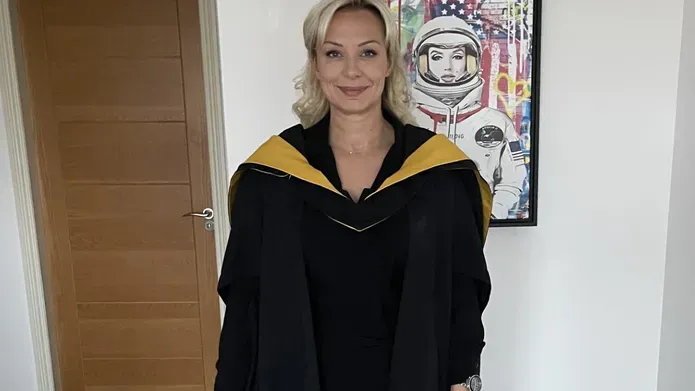News
Vicki Simpson-Price – graduate profile
Vicki Simpson-Price talks about her experience of the course MSc Applied Neuroscience.
Published on 11 March 2024

With a desire for a deeper understanding of the brain, psychotherapist Vicki Simpson-Price challenged herself to study a postgraduate MSc in Applied Neuroscience at the University of Dundee and now applies that knowledge to her practice.
“I chose the MSc Applied Neuroscience course because, being a psychotherapist, I have always wanted to have a more in-depth understanding of the human brain, behaviours and mental health. This course provided a clear study of that plus much more, and I was hoping to also achieve more scientific skill sets.
“Overall, my experience of the course was an exceptionally positive one, however very challenging. Having had no biological experience (as my BSc was in Psychology), the first few weeks of the course was eye opening and forced me into delving deeper into human/brain molecular and cellular biology. Although pushing me out with my comfort zone, I feel I really benefited from gaining a deeper understanding of this as it helped underpin what I was learning and going to be investigating on the course.
“The foundation in neuroscience module was very helpful as it gave a very good understanding of the anatomy and cellular functioning of the brain/central nervous system to allow me to move into semester two feeling more confident.
“The highlights for me were the ability to enter a lab setting, which I had never experienced before, and having access to technologies (confocal microscopy and MRI scanning machines) which I would have never been able to access normally.
“Furthermore, having the expertise of the staff to hand and allowing me to enter a very exciting project in Professor Jenni Harvey’s lab investigating the neuroprotective effects of Leptin against amyloid-beta insult on dendrites which is related to Alzheimer’s Disease was fascinating.
“The course gives you a greater understanding of the brain, experimental procedures used to investigate many biological and behavioural aspects of human/animal functioning, and the skills are highly relatable to many jobs, which can also include going on to study at PhD level.
“You certainly don’t require in-depth neuroscience knowledge to be successful on this course, however having a very healthy intertest is an advantage. Furthermore, I recommend you prepare yourself by generally looking into human biology and giving yourself a head start.
“My Applied Neuroscience degree has given me a sound understanding of human behaviour, pharmacokinetics, mental health, and allowed me to bolt this knowledge on to working with clients within a therapeutic capacity. I am now able to tailor certain models of therapy to work more deeply with clients and offer psychoeducation around their understanding of how their brains work. It has further allowed me to develop interventions know as ‘Neurohacks’ to assist in anxiety for example.
“Since graduating I have continued working as a Psychotherapist within private practice, but furthermore I’m now working as a student counsellor in Dundee and Angus College. I deliver CPD events to students/staff and organisations covering aspects of mindset, understanding mental help and the importance of sleep to name a few.
“Eventually, I wish to enter a PhD within neuroscience.”
Vicki graduated from the University of Dundee with a MSc in Applied Neuroscience (with Distinction) in 2023.